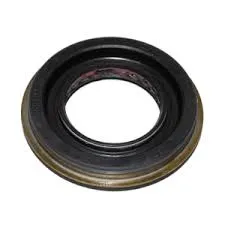10 月 . 18, 2024 17:37 Back to list
Similar Oil Seal Dimensions 16x28x7 for Reliable Performance and Durability
Understanding the Oil Seal A Focus on the 16x28x7 Specification
Oil seals are crucial components found in various mechanical systems, playing an essential role in sealing lubricants and preventing contamination. Among various sizes and specifications, the oil seal measuring 16x28x7 is a versatile piece used in numerous applications. This article will explore the function, construction, application, and selection of the oil seal, specifically focusing on the 16x28x7 size.
What is an Oil Seal?
An oil seal, also known as a lip seal or fluid seal, is designed to retain lubricants and prevent leakage while keeping foreign particles out of machinery. They are usually made from materials like rubber or plastic, which allows them to maintain flexibility and resilience under varying conditions. Oil seals are essential in preserving the integrity of various systems, especially in rotating equipment, automotive applications, and industrial machinery.
Dimensions Explained 16x28x7
The dimensions of an oil seal are significant in determining its suitability for a particular application. The size 16x28x7 indicates the following
- 16 mm This is the inner diameter (ID) of the seal. It must accurately fit the shaft or housing where it will be installed. - 28 mm This represents the outer diameter (OD) of the seal, indicating the part that fits into the housing or bore. - 7 mm This is the thickness of the seal. The thickness can affect the seal's capacity to withstand pressure and its overall durability.
These measurements highlight the importance of ensuring the correct size when replacing or installing an oil seal to prevent leaks and maintain effective operation.
The Function of Oil Seals
oil seal 16x28x7

The primary function of any oil seal, including the 16x28x7, is to prevent fluid leakage while retaining the lubrication necessary for smooth operation. Additionally, oil seals keep dirt, dust, and moisture from entering the machinery, which can cause wear and tear over time. They perform effectively under a variety of conditions including temperature fluctuations, pressure variations, and exposure to different chemicals.
Applications of 16x28x7 Oil Seals
The 16x28x7 oil seal is widely used in various sectors including
- Automotive These seals are often found in engines, differentials, and transmissions. They are crucial for maintaining the oil and lubrication systems, preventing oil leaks that could lead to severe mechanical failures. - Industrial Machinery In manufacturing equipment, oil seals play a vital role in hydraulic systems, pumps, and motors. They ensure that hydraulic fluids remain contained, enhancing efficiency and reliability. - Agricultural Equipment Owing to their robust nature, these seals are utilized in tractors and other farming machinery where exposure to dirt and heavy use are common. - Home Appliances Small appliances like washing machines and refrigerators may also use oil seals to contain lubricants within motors and pumps.
Selecting the Right Oil Seal
When choosing an oil seal, it's essential to consider several factors
1. Material Common materials include Nitrile (Buna-N), Viton, and silicone. The choice of material should align with the operating temperature range and the type of fluid involved. 2. Compatibility Make sure the seal you select is compatible with the specific lubricant or fluid used in your application, as incompatible materials can cause seal failure. 3. Operating Conditions Assess the environmental conditions such as temperature extremes, chemical exposure, and the operating pressure to select a seal that can withstand these factors. 4. Installation Space The available space for installation is also critical as it impacts the choice of seal dimensions and type.
Conclusion
The 16x28x7 oil seal is a small yet vital element in many mechanical systems. Its ability to retain lubricants and exclude contaminants makes it indispensable in automotive, industrial, and domestic applications. Understanding its specifications, function, and proper selection is essential for maintaining the efficiency and longevity of machinery. As technology and materials advance, the reliability and performance of oil seals will continue to evolve, supporting the needs of various industries and applications. Whether you’re working on a vehicle or industrial equipment, ensuring you have the right oil seal can make a significant difference in performance and durability.